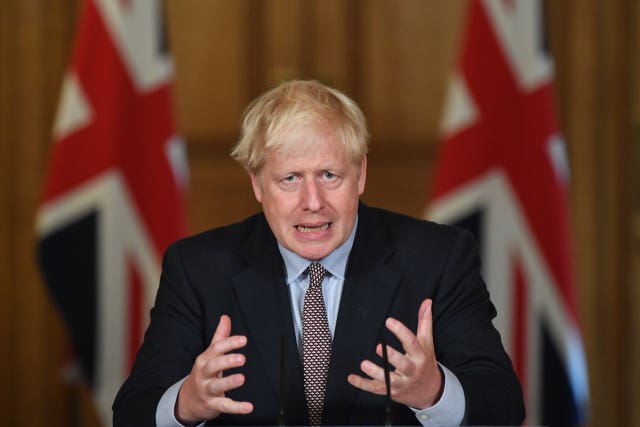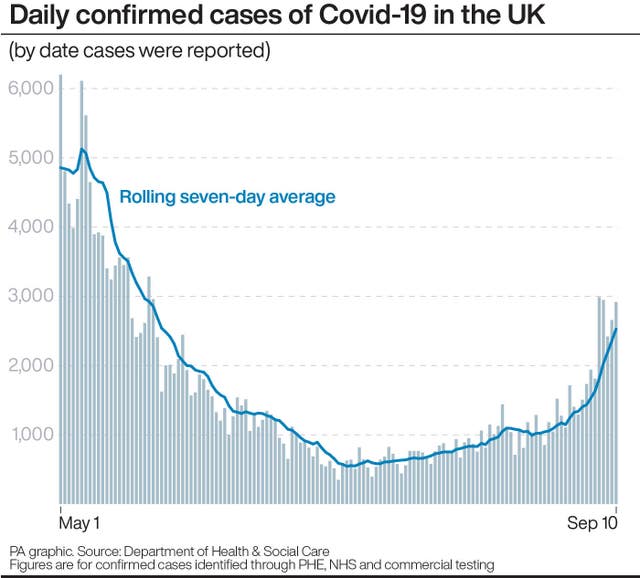Boris Johnson is facing open revolt from some Tory backbenchers over new lockdown restrictions, with one former minister declaring:
It is time for us to actually start living like a free people, not subjecting ourselves to constantly shifting legal requirements.
It comes as coronavirus rates continued to increase across parts of the UK with Leeds and Birmingham among areas at risk of further lockdown measures.
Revolting
Ministers are allegedly divided over new social distancing rules in England that will limit social gatherings to groups of just six people both indoors and outside from Monday.
The Daily Telegraph reported on Friday that senior Tories want younger children to be exempt from the so-called “rule of six” in England. The Daily Mail claimed health secretary Matt Hancock was the only cabinet minister on Boris Johnson’s coronavirus strategy committee to support the plan at a meeting on Tuesday, the day before it was announced by the prime minister.

Speaking on Friday, former Tory minister Steve Baker told BBC Radio 4’s Today programme:
I think it is now time to say that this is not a fit legal environment for the British people…
And it is time for us to actually start living like a free people, not subjecting ourselves to constantly shifting legal requirements, which I think now no-one can fully understand
Baker added:
It seems to me the effect of having Covid marshals will be to turn every public space in Britain into the equivalent of going through airport security where we are badgered and directed… I’m not willing to live like this.
His comments come as the most recent data for the seven days to September 7 showed Birmingham had the second highest rate of new cases in the country at 85.4 per 100,000 people and 975 new cases while Leeds had 536 new cases and a rate of 67.6.

Scrutiny is needed
Since the government enacted its coronavirus legislation, it has been able to pass additional measures without proper scrutiny. In June, the Telegraph reported that 90 such laws had been passed without going through parliament.
Big Brother Watch is monitoring the new legislation. It stated that:
Emergency measures are needed to protect public health. However, they must be proportionate, lawful and strictly temporary way, to protect our democracy in the long run.
Since the pandemic began, the UK has been under ministerial rule. Draconian powers have been seized, democratic processes have been evaded, and our most basic liberties have been suspended. Protecting public health doesn’t require this new authoritarian political order.
And as The Canary previously reported, there is a contradiction between pubs and schools remaining open, but banning more than six people meeting. Kevin Blowe, coordinator of the Network for Police Monitoring stated:
The new rules are intended to crack down on unlicensed music events, not least because people (especially from Black and working class communities) enjoying themselves has historically been seen as a public order threat. It doesn’t matter to the government that pubs are just as likely to spread infection.
Other options
Several countries have managed to maintain freedoms by using track and trace systems. The UK has struggled to get a similar system up and running with the Engineer referring to the lack of a contact tracing app as a “spectacular failure” in August.
Writing about issues in the UK, professor Calum Paton stated in August:
The next step [after failing to quarantine flights from corona hotspots] therefore had to be ‘track and trace’ the virus from the outset. But any competent executive would have known already that the UK’s capacity to test and trace had been decimated. A Cabinet Office report in 2015, Exercise Cygnus, set out the extent of government spending cuts in health protection and how warnings about lack of preparedness for control of pandemics had been buried (Cabinet Office, 2015). So speedy initial action on flights and quarantine had been all the more necessary. Worse, when the creation of a viable new test and trace policy became vital, the UK government’s new test and trace scheme took months to develop. It was heralded as ‘world-beating’, but, as the New York Times noticed, the British government was better at self-congratulation than delivery
However, even though there is now a track and trace system in place, it is still beset by problems. The Guardian reported on 3 September that:
The latest figures from the NHS test-and-trace programme showed that 80% of people who tested positive in England in the week to 26 August were contacted by tracing teams and asked to self-isolate. But almost a third (30.6%) of their contacts – the people with whom they had been mixing prior to the test – went unreached.










